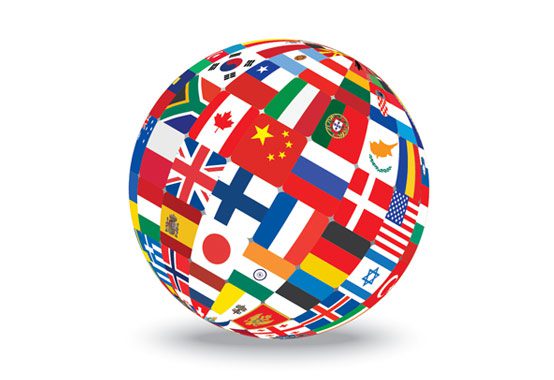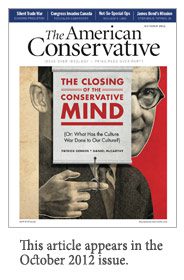We Are Not All Westerners Now

In Blind Oracles, his study of the role of intellectuals in formulating and implementing U.S. foreign policy during the Cold War, historian Bruce Kuklick equated these scholars with the “primitive shaman” who performs “feats of ventriloquy.”
We tend to celebrate foreign-policy intellectuals as thinkers who try to transform grand ideas into actual policies. In reality, their function has usually been to offer members of the foreign-policy establishment rationalizations—in the form of “grand strategies” and “doctrines,” or the occasional magazine article or op-ed—for doing what they were going to do anyway.
Not unlike marketing experts, successful foreign-policy intellectuals are quick to detect a new trend, attach a sexy label to it (“Red Menace,” “Islamofascism”), and propose to their clients a brand strategy that answers to the perceived need (“containment,” “détente,” “counterinsurgency”).
In No One’s World, foreign-policy intellectual Charles Kupchan—a professor of international affairs at Georgetown University and senior fellow at the Council on Foreign Relations—tackles the trend commonly referred to as “American decline” or “declinism,” against the backdrop of the Iraq War, the financial crisis, and the economic rise of China.
While I share Kuklick’s skepticism about the near zero influence that intellectuals have on creating foreign policy, I’ve enjoyed reading what thinkers like Charles Kupchan have to say, and I believe that if we don’t take them too seriously (this rule applies also to what yours truly has written about these topics), they can help us put key questions in context. Such as: is the U.S. losing global military and economic dominance and heading towards decline as other powers are taking over?
The good news is that Kupchan’s book is just the right size—around 200 pages—with not too many endnotes and a short but valuable bibliography. Kupchan is readable without being too glib. He is clearly an “insider” (he is a former National Security Council staffer) but exhibits a healthy level of detachment. And Kupchan displays a commendable willingness to adjust his grand vision to changing realities.
In a book published ten years ago, The End of the American Era: U.S. Foreign Policy and the Geopolitics of the Twenty-first Century, Kupchan advanced the thesis that an integrating European Union was rising as a counterweight to the United States, with China secondary to the EU. That was his view then. The thesis has since been overtaken—let’s say, crushed to death—by the crisis in the eurozone and the failure of the EU to develop a unified, coherent foreign policy. But unlike neocons who spend much of their time trying to explain why, despite all the evidence to the contrary, they have always been right, Kupchan doesn’t even revisit his now defunct thesis.
While this suggests that we should treat his current book and its claims that the global balance of power is shifting from the United States and the “West” and towards the “Rest”—non-Western nations like China, India, Brazil, and Turkey—with many grains of salt, we should nevertheless give Kupchan credit for pursuing a non-dogmatic, pragmatic, and empiricist approach to international relations.
Kupchan may once have worked on implementing the liberal-internationalist agenda of the Clinton administration, but the views advanced in his latest book—in particular his pessimism about America’s ability to “manage” the international system and his emphasis on the role that history and culture play in relationships between nation-states—place him in the intellectual camp of realist foreign-policy intellectuals like George Kennan and Henry Kissinger, at a time when not many of them are around in Washington.
Kupchan’s thesis that America and its Western allies are losing their global military, financial, and economic power, and that the rising non-Western powers are not going to adopt Washington’s strategic agenda, may not sound too revolutionary these days, when even the most non-contrarian strategists and economists working for the Pentagon and Wall Street recognize that the dominance of the West is on the wane.
But in a chapter titled “The Next Turn: The Rise of the Rest,” Kupchan provides the reader with the “hard cold facts” as he skims through forecasts made by government agencies and financial institutions predicting that China’s economy will pass America’s within the current decade. And while America is still overwhelmingly the greatest military power on the planet, it is only a question of time, according to Kupchan, before China overtakes the United States in this arena as well and contests America’s strategic position in East Asia. “The Chinese ship of state will not dock at the Western harbor, obediently taking the berth assigned to it,” he concludes.
What lends Kupchan’s overall theme a certain conservative and Kennan-like quality is the challenge he poses to the reigning ideological axiom shared by U.S. and Western elites since the end of the Cold War: the notion that the core ideas of the modern West—enlightenment, secularism, democracy, capitalism—will continue to spread to the rest of the world, including to China and the Middle East, and the Western order as it has evolved since 1945 will thus outlast the West’s own primacy.
Even the most doctrinaire neocon assumes that American and Western hegemony must come to an end at some point. But that won’t matter since the Rest will end up being just like us—holding free elections, embracing the free markets, committed to a liberal form of nationalism and to the separation of religion of state. Such values and practices will guarantee that rising states like China and India bind themselves to a liberal international order based on functioning multilateral institutions, free international trade, and collective security.
Kupchan doesn’t buy this vision. The “Western Way” is not being universalized, he argues, and the international system looks more and more like a mosaic of nations, each following its own path towards modernization, a path determined by unique historical circumstances and cultural traditions that may not result in anything like our own liberal and democratic principles.
Hence, China can embrace a form of “communal autocracy,” Russia chooses a system of “paternal autocracy,” while the Arab world follows the route of “religious and tribal autocracy.” Iran remains a theocracy, and other non-liberal political orders may flourish in parts of Latin America and Africa.
In a way, Kupchan is doing here what foreign-policy intellectuals do best, inventing catchy labels to describe existing trends in China, Russia, and the Arab world that are familiar to anyone who follows current events. Kupchan argues, however, that these trends are quite enduring and that the United States and Europe should deal with this reality instead of pursuing policies based on wishful thinking—expecting, for example, that the Islamists ruling Egypt and the communist-fascists in Beijing will eventually be replaced by a bunch of liberal democrats. It ain’t going to happen, Kupchan predicts. Free elections can in fact lead to the victory of anti-Western and anti-American leaders, while capitalism is just a system that allows governments to harness wealth for aggressive nationalist policies.
As many conservatives would point out, the notion that we are all taking part in an inexorable march towards enlightenment, prosperity, and liberty that culminates in the embrace of liberal democracy, representative government, and free markets here, there, and everywhere is only one version of history, described sometimes as “Whig history.”
What is basically the story of the emergence of constitutional democracy in Britain and America has been applied broadly to describe the political and economic development of Europe and West in general from around 1500 to 1800—and to explain why the West prospered and rose to global prominence while other parts of the world, like the Ottoman Empire and China, stagnated and declined.
Kupchan himself subscribes to a Whiggish narrative, in which decentralized feudal power structures and the rise of an enlightened middle class that challenged the monarchy, aristocracy, and the church led to Europe developing modern liberal states and capitalism, while the Reformation exposed religion to rational inquiry and unleashed bloodshed that ultimately caused European societies to accept religious diversity. The growing costs of the modern state forced monarchs to share power with ever larger classes of citizens, while the rising middle class provided the economic and intellectual foundations for the Industrial Revolution, which in turn improved education and science and established the military power that allowed the West to achieve superiority over the more rigid hierarchical orders of the Ottoman Empire, India, China, and elsewhere.
Francis Fukuyama in The Origins of Political Order has argued that this Whig version of history may help explain how Britain and America developed. But in other parts of Europe, such political and economic changes as the rise of the modern state and notions of citizenship and political accountability were driven in large part by the villains of the Whig narrative, including monarchy and the Catholic Church.
There have always been different paths towards political and economic modernity, not only in contemporary China, India, Iran, and Brazil, but also in Europe and the West between 1500 and 1800—and later, with the rise of communism and fascism. Russia is an example of a nation whose road towards economic growth has been very different from that taken by the Anglo-Americans, or for that matter, the Germans, the French, or the Chinese.
 Kupchan could have provided us with a more simplified set of arguments to support his thesis—that China and Iran are not “like us”—by recognizing that the political and economic transformation of different European states was not based on a standard model of development. We therefore shouldn’t be surprised that Egypt and Brazil are also choosing their own non-Whig paths of change and growth.
Kupchan could have provided us with a more simplified set of arguments to support his thesis—that China and Iran are not “like us”—by recognizing that the political and economic transformation of different European states was not based on a standard model of development. We therefore shouldn’t be surprised that Egypt and Brazil are also choosing their own non-Whig paths of change and growth.
Contrary to Kupachan’s narrative, as the historian John Darwin argues in his masterpiece After Tamerlane: The Global History of Empire, Europe’s rise to pre-eminence was not a moment in the long-term ascent of the “West” and the triumph of its superior values. “We must set Europe’s age of expansion firmly in its Eurasian context,” Darwin writes, and recognize that there was nothing foreordained about Europe’s rise—or its current decline. Great powers like the Ottomans, the Safavids, the Mughals, the Manchus, the Russians and the Soviets, the Japanese and the Nazis have risen and fallen for reasons all their own. Today the Rest may be rising. But it has never been anyone’s world.
Leon Hadar, a Washington-based journalist and foreign policy analyst, is the author of Sandstorm: Policy Failure in the Middle East.
Comments